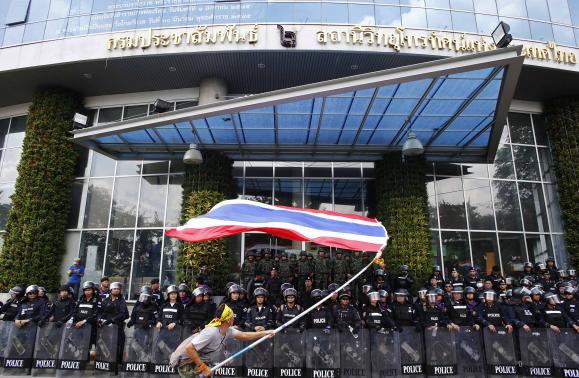
CREDIT: REUTERS/ATHIT PERAWONGMETHA
(Reuters) – Thailand’s acting prime minister on Monday ruled out resigning as a way out of a protracted political crisis that is stunting economic growth, as anti-government protesters stepped up pressure to remove him and install a new administration.
Thailand is stuck in political limbo following the dismissal of Prime Minister Yingluck Shinawatra and nine of her ministers on May 7 after a court found them guilty of abuse of power.
Six months of turmoil that has included violent protests and a disrupted general election is dragging down Southeast Asia’s second biggest economy, which shrank 2.1 percent in the first quarter of the year.
Commerce Minister Niwatthamrong Boonsongphaisan has replaced Yingluck as caretaker prime minister, but the anti-government protesters say he has no legal standing and they want a “neutral” government to push through reforms.
Niwatthamrong met members of the Senate, which is trying to come up with a way out of the deadlock, but he told them he would not resign.
“The current cabinet is legal in every way … it must stay until a new cabinet of ministers is elected in. We cannot install another prime minister while we have an acting one in place,” Niwatthamrong said in statement following the meeting.
Thailand has not had a functioning lower house of parliament since Yingluck dissolved parliament in December.
Bangkok is the scene of a tense stand-off between government supporters loyal to Yingluck and her brother, ousted former Prime Minister Thaksin Shinawatra, and opposition demonstrators drawn from Bangkok’s middle class and royalist establishment.
The upper house Senate, the country’s only remaining legislative body, says it could select an interim prime minister but it wants the caretaker government to step down first.
That has incensed protest leader Suthep Thaugsuban, who wants the caretaker government removed right away.
“We will take democratic power and hand it back to the people,” Suthep, a former deputy prime minister in a government run by the pro-establishment Democrat Party, told supporters late on Sunday.
“From Monday, we will chase the remnants of the Thaksin regime out. Ministers, resign! You are stunting Thailand’s progress,” said Suthep, who has promised to surrender to the authorities on May 27 if this final push does not succeed.
RECESSION LIKELY
Weak exports and the political mayhem has damaged the economy, which shrank by 2.1 percent in January-March from the final quarter of 2013, according to state planning agency data released on Monday.
The agency cut its forecast for 2014 growth to between 1.5 and 2.5 percent, from a range of 3.0 to 4.0 percent.
It noted that public investment was 19.3 percent lower than a year before as the caretaker government has no authority to begin new projects, while private sector investment fell 7.3 percent as business confidence slumped.
“It’s likely there’ll be recession in the second quarter because all the figures came in bad,” said Pragrom Pathomboorn, an economist with KGI Securities, adding that much would depend on how events unfolded in coming days.
“If it drags on without a functioning government in the third quarter, we think the economy will grow just 0.8 percent this year.”
Adding to the caretaker governments woes, a confederation of labor unions representing workers in around 20 Thai state firms sided with protesters by calling for a strike this week.
“The ministers who remain refuse to resign, so we ask that state labor unions go on strike as of Thursday,” said Komsan Thongsiri, secretary-general of the State Enterprises Workers’ Relations Confederation.
“Many are still discussing whether they will strike. But, big state organizations, including utilities and transport companies, have often sided with us.
RED SHIRT WARNING
The government and its supporters view a general election as the best way to solve the crisis – the ruling Puea Thai Party would be well placed to win – but a vote tentatively scheduled for July 20 looks to be off the table.
A February 2 election was disrupted by Suthep’s supporters and then declared void by the Constitutional Court. The protesters say they will disrupt any vote before changes to the electoral system are pushed through.
Thaksin was ousted by the army in a 2006 coup and convicted of abuse of power in 2008. He now lives in self-imposed exile. His enemies accuse him of being a corrupt crony capitalist who controls governance through “money politics”.
Thousands of Thaksin’s “red shirts” loyalists have been camped out in Bangkok’s western outskirts to oppose any efforts to install an unelected prime minister.
Fuelling their anger, Monday marked the fourth anniversary of a deadly crackdown on red shirt protesters by the Democrat-led government in which Suthep was a deputy prime minister.
In 2010, red shirts demonstrated for weeks demanding that then Prime Minister Abhisit Vejjajiva call a fresh election. More than 90 people, most of them protesters, were killed.
Both Abhisit and Suthep face murder charges for their role in ordering the military to end the protests.
“We will safeguard the people’s power until our last breath,” red shirt leader Jatuporn Prompan told supporters on Monday.
The army has tried to stay out of the fight this time, but
in a rare televised announcement last week the army chief said it would have no choice but to use “full force” if government supporters and opponents clashed.
The political divisions are poisoning virtually every aspect of society.
Thailand’s newly crowned candidate for the Miss Universe pageant, Weluree Ditsayabut, 22, has outraged the red shirts after disparaging remarks she posted on Facebook. “I am so angry at these evil activists. They should all be executed,” read one comment. She apologized on Monday, media reported.







